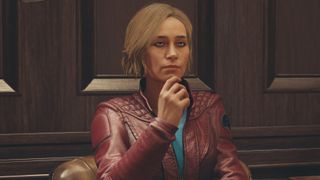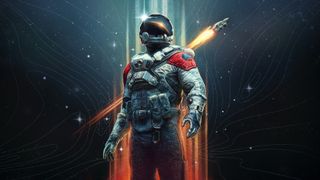Critics are mostly positive on Starfield, but not unanimous: From 10/10s to 'cold, lifeless, and uninspired'
The positive, negative, and in-between reviews of Bethesda's enormous RPG.

Starfield is here, and after dozens of hours floating in space our reviewer Chris Livingston liked it—but didn't love it. "Starfield is Bethesda's biggest RPG ever, and it shares even more DNA with Skyrim and Fallout 4 than I expected—but it ultimately falls far short of the greatness of both of those games," he wrote in his 75% Starfield review.
As one of the most anticipated games of the year, there are unsurprisingly already tons of Starfield reviews online from other publications that have been playing the game for the last week. Although there are some notable exceptions: Bethesda didn't provide early review code to UK-based publications Eurogamer, The Guardian, and our sister magazine Edge until shortly before or just after today's embargo. That means there are still more reviews to come—but with 97 reviews already collected on OpenCritic, there's already a wide spread of reactions, from "this could be one of the most ambitious games ever made" to "a mile wide, but an inch deep."
Here's what the critics are saying.
"Starfield is the best thing Bethesda has done since The Elder Scrolls 4: Oblivion"

Starfield guide: Our hub of advice
Starfield console commands: Every cheat you need
Starfield mods: Space is your sandbox
Starfield traits: The full list, with our top picks
Starfield companions: All your recruitable crew
Starfield romance options: Space dating
Leon Hurley highlights how easy it is to get distracted by things to do in Starfield. "Whatever style of play appeals to you there's almost certainly something in Starfield to support it. Killing everyone is always kind of the default option but you can be stealthy, or get creative with dialogue and tech to find your own solutions."
Comparing Starfield to Oblivion, Hurley says it "has that same density and life to it" and that "Starfield represents some of the best world building the studio has done in a long time. For every moment I've spent careening around planets shooting anything that moves, there are always other opportunities presented elsewhere: casing a museum to steal its contents, or mingling at a billionaire's cocktail party trying to uncover embezzlement."
"It’s never a great sign when someone recommends a game on the grounds that it gets good after more than a dozen hours"
The biggest gaming news, reviews and hardware deals
Keep up to date with the most important stories and the best deals, as picked by the PC Gamer team.
Like our own review, IGN director of reviews (and PC Gamer alum) Dan Stapleton took particular issue with Starfield's opening hours, writing "Things never went too far off course while I was flying my rinkydink little ship around chasing down mysterious artifacts and war criminals with a damn fine crew of companions at my side, but man did Starfield make me work hard to get through that opening stretch."
Stapleton praised the ship building, some clever skills and quests and companions, but criticized how exploration ultimately amounts to fast travel, and how long it took many pieces of Starfield to gel. "It’s impossible not to compare Starfield to the way you freely enter and exit planets’ atmosphere in No Man’s Sky, so it’s a bit of a letdown every time you see a planet and remember it’s just a picture of a planet you’ll never be able to reach by flying toward it. It’s something that happens a lot."

"A rich palette of activities and missions that tap into the outer space fantasy"
Game Informer's Matt Miller wrote that Starfield's scope "threatens to impair the focus and pacing, and moment-to-moment gameplay is not always a strong suit," but ultimately comes down strongly in favor of the RPG. He particularly praised the "top-notch" dialogue and storytelling, "endless distractions" and nailing "the joy of exploration."
But he also had criticism of the "obtuse" star map, which hampered the seamlessness of travel, as well as the UI. And ship battles were largely a miss, either being far too easy or far too hard. "Go in with the expectation that it will take some time to find your footing in such a vast gameplay space, and there’s a universe well worth discovering here."
"The studio’s best attempt to marry satisfying action game mechanics to an open-ended adventure"
Gene Park praised Starfield's combination of action and roleplaying, pointing out how Fallout 4 had dropped many of those RPG elements in favor of getting the action right. He did have criticisms of the way Bethesda "sacrificed a sense of intimacy they once mastered" with the larger galaxy, and of the lack of "seamless transition between planets and atmosphere."
But Park still awarded the game a 4/4, praising the main story as "easily the best Bethesda quest yet" and said that "yes, the player’s movement is incredibly disjointed through the game’s many parts, but that’s all in service of detail rarely matched in any entertainment medium."
"For all its reverence for scientific philosophy, its stories and characters paint a rather tame and sterile vision for what our spacefaring future could look like"
GameSpot's Michael Higham was less enamored with the RPG, writing that it follows "a very familiar formula" that doesn't do enough to engage with its setting despite the sense of scale: "ultimately a mile wide and an inch deep." Higham called out most of the dialogue with Constellation's members as generic and the choices you get throughout feeling insignificant: "Dialogue options evoke slightly different responses or tease more information, but rarely influence the overarching path." He did praise the shooting, space exploration, and how polished Starfield is considering its scale.
"The most opulent of patchwork blankets"
RPGSite's Alex Donaldson wrote that Starfield offers the "best-ever version" of Bethesda's type of game, praising how immersive it feels and just how much there is to do. "Chances are if you can imagine a science fiction or space game trope, it’s in here… Starfield is effortlessly the sort of game that can ignite true childlike curiosity and glee; where you’re on target to one specific objective and then spot something off in the distance or to the side that completely sidetracks you for hours at a time."
Donaldson pointed out that he expects the lack of seamless exploration to be divisive, and that "the stop-start nature of navigating the galaxy was slightly jarring at first" but that eventually he came to like the separation between ship building, fighting, and exploration.
"It feels cold, lifeless, and uninspired… less a startling or awesome vision of the future than a hodgepodge of obvious influences"
Paste's Garrett Martin wrote that Starfield "makes exploring unknown galaxies feel like drudge work," stating that its major failing is in the writing: "It lacks the memorable characters of Fallout 4, the compelling mysteries you discover on the edges of Skryim’s main quest, and the strong sense of place of Fallout 3."
The procedurally generated planets also fell flat for him, even though he ultimately found exploration Starfield's strength. While he looked over the faults in Bethesda's past games "because of the quality of the writing and the worldbuilding," that didn't happen in Starfield. "Playing Starfield makes me want to play games that explore space and games that were made by Bethesda, but it doesn’t make me want to play Starfield. It tries to give us the universe, but it’s so weighed down by its own ambitions and a fundamental lack of inspiration that it can’t even get into orbit."

Wes has been covering games and hardware for more than 10 years, first at tech sites like The Wirecutter and Tested before joining the PC Gamer team in 2014. Wes plays a little bit of everything, but he'll always jump at the chance to cover emulation and Japanese games.
When he's not obsessively optimizing and re-optimizing a tangle of conveyor belts in Satisfactory (it's really becoming a problem), he's probably playing a 20-year-old Final Fantasy or some opaque ASCII roguelike. With a focus on writing and editing features, he seeks out personal stories and in-depth histories from the corners of PC gaming and its niche communities. 50% pizza by volume (deep dish, to be specific).
Most Popular

